#frank mildmay
Text
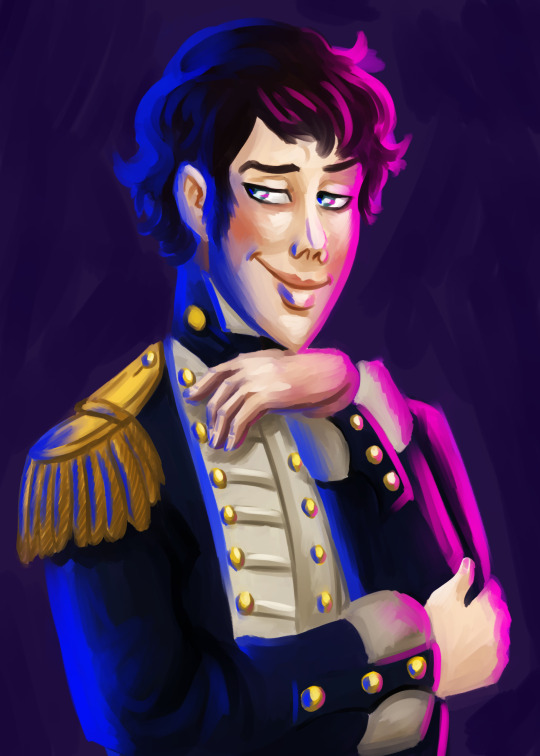
A commission of Frank Mildmay with Bisexual Lighting for @clove-pinks
28 notes
·
View notes
Text

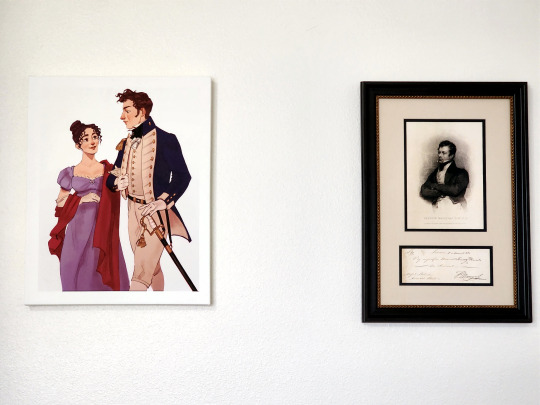
My new desk/study area coming together very nicely, feat. Captain Marryat's portrait and signed cheque complimented by @elyksina art of Frank Mildmay.
#shaun talks#frederick marryat#frank mildmay#my original idea for the commission was frank romancing some random girl in halifax (which is canon)#but it could also be his canon love interest and future wife emily somerville#the marryat corner with his gary stu
44 notes
·
View notes
Text
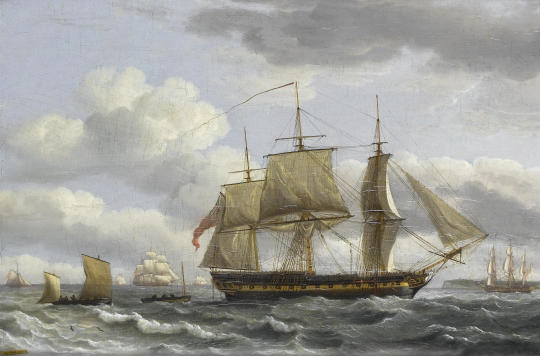
The discipline of public schools, bad and demoralizing as it is, was light, compared to the tyranny of a midshipman's berth in 1803.
— Frederick Marryat, The Naval Officer (Frank Mildmay)
Thomas Luny, A British frigate backing her sails as she heaves-to approaching Torbay with other ships of the fleet beyond, 1803. (Wikimedia Commons)
#frederick marryat#captain marryat#age of sail#frank mildmay#midshipman monday#thomas luny#frigate#royal navy#midshipman#1803#naval history#maritime art#marine art#seascapes
24 notes
·
View notes
Text
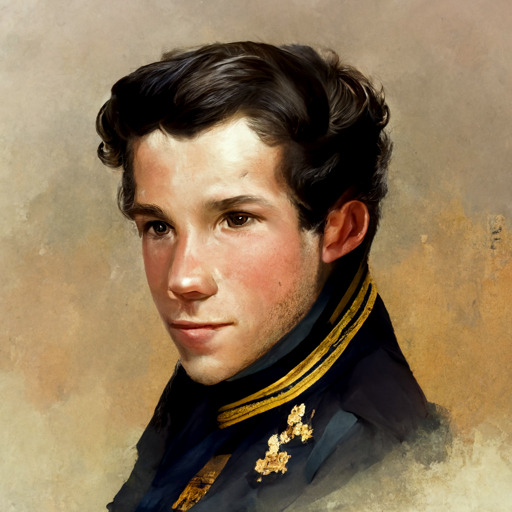
The Naval Officer Frank Mildmay
"I was now in my twenty-second year; my figure was decidedly of a handsome cast; my face, what I knew most women admired. My personal advantages were heightened by the utmost attention to dress; the society of the fair Arcadians had very much polished my manners, and I had no more of the professional roughness of the sea, than what, like the crust of the port wine, gave an agreeable flavour; my countenance was as open and as ingenuous as my heart was deceitful and desperately wicked."
-- Frederick Marryat, Frank Mildmay, or The Naval Officer
generated from the text prompt
"young proud handsome arrogant smirking Royal Navy naval officer"
and image prompts of:
the naval novellist captain frederick marryat
and a picture of ioan gruffudd as hornblower
using the neural network AI midjourney
with a few edits and tweaks post-generation
with thanks and inspiration to @marryat92
37 notes
·
View notes
Text

#maritime matchups#round 1#alexander macintosh#the nancy#stan rogers#frank mildmay#the naval officer
3 notes
·
View notes
Text
Okay per the recommendations from @marryat92 I downloaded Frank Mildmay and this note in the preface is so funny??
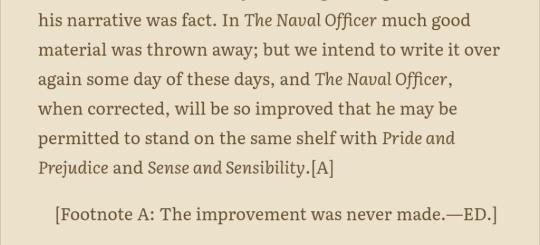
#shipposting#frederick marryat#frank mildmay#this honestly has me so excited to read the rest of this#what kind of book is he trying to write? what kind of book did he actually write??#stay tuned i guess
2 notes
·
View notes
Note
We don’t talk about Ezra (aka I watched enanto with Nevermoor brainrot)
Martha: We don't talk about Ezra , oh, no, no!
We don't talk about Ezra ... but
It was a winter day
Charlie: It was a winter day
Martha: They were they were in the plaza, and there wasn't a soul asking why
Charlie: No one ever asked why
Martha: the wundersmith sings and his hounds barking back
Charlie: Wunder!
Martha: You telling this story, or am I?
Charlie: I'm sorry, little bee, go on
Martha:Ezra says, "the end is near”
(They are so dead)
In doing so, he spreads his fear
(Prepare for bloodshed)
Soon there was but graves and tears
Charlie: What a horrid story but sleep sound
Both: We don't talk about Ezra , no, no, no!
We don't talk about Ezra!
Jack: Hey! Spent my Childhood in fear of the Wundersmith returning
I thought that hear him sort of humming, smell of burning
I associate him with the sound of baying hounds , Ooh-Awoo
Got a heavy duty with the burdens so unwieldy
Always left the people of the free state reeling
Seeing the Wundrous gifts they couldn't understand
Do you understand?
Frank: a wicked, wretched man
With eyes of gleaming black
When you dew his ire there was no turning back
And now he haunts dark dreams
And longs to hear us scream (hey!)
We don't talk about Ezra , oh, no, no! (We don't talk about Ezra , oh, no, no!)
We don't talk about Ezra(we don't talk about Ezra !)
Chanda: he was a sweet young boy
Then- well you know (Oh, no!)
Sofia: his life was complicated but the story they show…(no, no!)
Jupiter: stay away from him he lies like wind blows (no, no! Hey!)
Chorus: if you want to live and you see him you should go!
Mildmay: He told me that my dark fantasies were within reach if only I tried
He told me that he loved me but I should have known, should have known, that he lied
Kedgeree: Oye, Israfel’s on his way
Mildmay: he tempted me with the power I dreamed of if I gave him what he desired
Jack: It's like I hear him now
Squall:Miss Crow, I want not a word out of you (I can hear him now)
Jack: I can hear him now
Mog:Um, Ezra ...
Yeah, about that, Ezra...
I really need to know about Ezra ...
Give me the truth and the whole truth, Ezra
(Uncle Jove! your boyfriend's here)
Time for dinner!
A wicked, wretched man (it was a winter day, it was a winter day)
With eyes of gleaming black (they were in the plaza)
When you drew his ire (and there wasn’t a soul asking why)
There was no turning back (no one ever asked why!)
Now he haunts dark dreams (the Wundersmith sings and his hounds barking back)
And longs for our screams (Wunder!)
You telling this story, or am I?
I'm sorry,little bee , go on (oye , Israfel is on his way)
Ezra says, "the end is near” (a wicked, wretched man with eyes of gleaming black)
In doing so, he spreads his fear
Soon there was but graves and tears
Kedgeree: He's here!
All: Don't talk about Ezra , no! (Why did I talk about Ezra ?)
Not a word about Ezra !
Mog: I never should've brought up Ezra !
This is PERFECT! I love it
I'm imagining mildmay being lowered to the ground on a swing made of vines now.
Pure gold
28 notes
·
View notes
Text
i’m forcing myself into the nevermoor fandom so we’ve got orientation/gender headcanons
morrigan crow - she/her, cis girl, asexual lesbian
cadence blackburn - she/they, nonbinary lesbian
hawthorne swift - he/him, trans boy, bisexual
mahir ibrahim - he/him, cis boy, gay (he’s also jewish because i say so)
archan tate - they/he, genderfluid, gay and asexual
francis fitzwilliam - he/him, trans boy, bi aroace
anah kahlo - she/her, trans girl, pansexual
thaddea macleod - she/her, cis girl, lesbian
lamya ra/lambeth amara - they/them, nonbinary lesbian
jupiter north - he/him, cis man, bisexual
jack korrapati - he/they, trans demiboy, gay
marina cheery - she/her, trans woman, lesbian (canon!)
dame chanda kali - she/her, cis woman, pansexual and polyamorous
frank - he/they, nonbinary, gay
israfel - they/xe/he, nonbinary, pansexual
roshni singh - she/they, cis woman, lesbian (canon!)
baz charlton - he/him, cis man, gay (gives off major homophobic vibes but i choose to believe homophobia doesn’t exist in nevermoor)
henry mildmay - he/him, cis man, agonizingly heterosexual
ezra squall - he/they, demiboy, bisexual
#nevermoor#nevermoor: the trials of morrigan crow#wundersmith: the calling of morrigan crow#hollowpox: the hunt for morrigan crow#morrigan crow
14 notes
·
View notes
Photo

“Youths Demonstrate Wireless Power Invention,” Toronto Star. January 5, 1933. Page 3.
----
Claiming they have invented a process whereby electricity can be transmitted without a wire conductor, two Mildmay youths have startled the electrical world by a demonstration of their invention to some two score relatives and townsfolk in Bruce county. Placing a transmitter in a farmhouse a mile and a half from the village of Mildmay, Frank Fedy and his partner, Ted Hesch, received enough electrical current ‘from the air’ to light some 25 bulbs in the store of Fedy’s father without the use of wires of any description, they claim. In (1) is shown the home of Joseoh Reinhart, one and a half miles from the Fedy store, where the transmitter was placed the night of the demonstration. Ted Hesch (2), pal and partner of Frank Fedy in the enterprise, who is a blacksmith by trade. Frank Fedy is shown in (3) with part of the equipment he has invented. Joseph Reinhart (4), farmer, with his dogs, on whose farm the sending equipment was placed. Alex. Fedy’s store (5) lit up by the electrical current, and in (6) is shown Ted Hesch and (7) Frank Fedy, the youthful inventors.
#mildmay ontario#bruce county#wireless power#wireless power transfer#power transmission#wireless energy transfer#inventors#small town ontario#blacksmith#youth in history#canadian history#great depression in canada
0 notes
Text
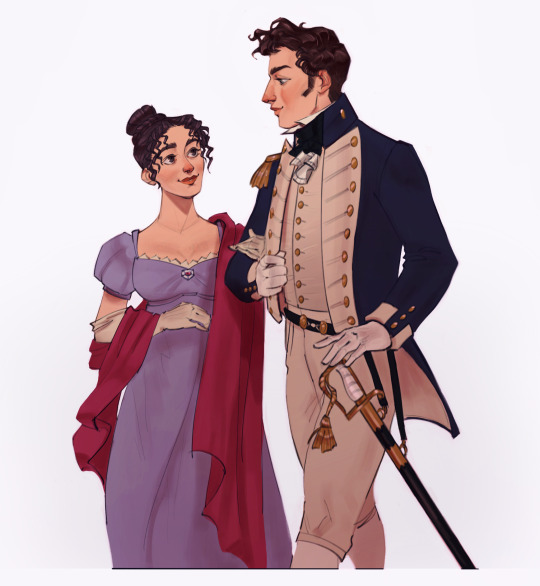
1812 Frank Mildmay & companion. Commission for @clove-pinks!
#character art#marryat#captain marryat#Frank mildmay#art#sketches#commission#napoleonic#historical fashion#fashion history
246 notes
·
View notes
Text
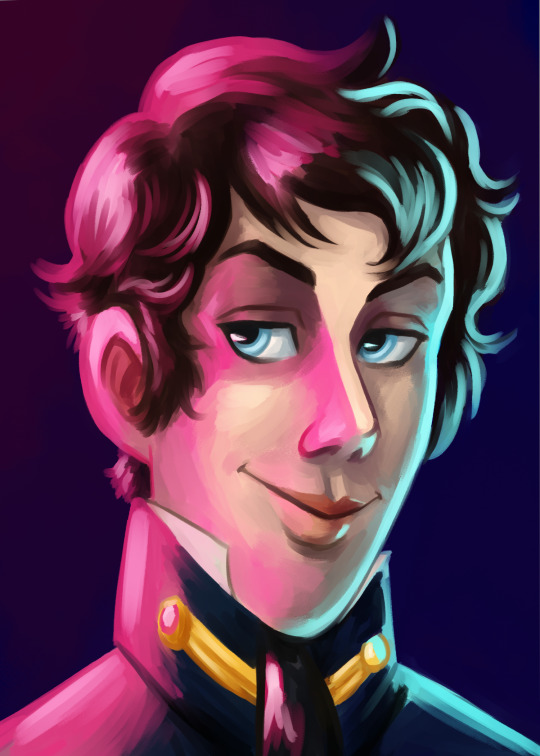
A commission for @clove-pinks of Frank Mildmay
73 notes
·
View notes
Text
They should stop having sad soggy pathetic boat men tournaments and start having Smug Obnoxious Jerk Boat Man tournaments. I nominate all of Captain Marryat's protagonist characters and also Marryat himself.
#frederick marryat#captain marryat#i'm thinking about#frank mildmay#jack easy#percival keene#i like to pretend i live in a world where people know marryat and his works
21 notes
·
View notes
Text

There was a dreadful stillness between the blasts, which the pitch darkness made peculiarly awful to an unfortified mind. It is for this reason that I would ever discourage night-attacks, unless you can rely on your men. They generally fail: because the man of common bravery, who would acquit himself fairly in broad daylight, will hang back during the night. Fear and darkness have always been firm allies; and are inseparably playing into each other’s hands.
— Frederick Marryat, The Naval Officer (Frank Mildmay)
Night attack, Portsmouth, William Lionel Wyllie, c. 1890.
#frederick marryat#captain marryat#age of sail#frank mildmay#night attack#combat#british literature#william lionel wyllie
35 notes
·
View notes
Text
Technically it’s not midshipman monday because I am Australian and live in the future
but I must show my appreciation for the middies
#cadmus rambles#also I started reading frank mildmay by captain marryat and oh my god frank is such a shithead#it’s great#after this maybe I will try to hornblower or read flight of the heron
3 notes
·
View notes
Text

welcome to ROUND 1 of the MARITIME MATCHUPS!
Round 1 Masterpost:
Nigel and Chauncey Badminton vs Peter Calamy
Henry Noble vs Hiram Nightingale
Horatio Nelson (As Portrayed by Jim Howick) vs Sir John Franklin
Midshipman Longley vs William Blakeney
Barrett Bonden vs the Dark-Spectacled Admiral
Francis Crozier vs James Barnes
Chadwick Goodfellow vs Marmaduke Bonthrop Shelmerdine
Arthur Courtney vs Midshipman Hollom
Alexander MacIntosh vs Frank Mildmay
Captain Chase vs Roger Byam
William Mowett vs Sir Edward Pellew
William Bush vs Thomas Pullings
William Laurence vs James Norrington
Archie Kennedy vs Frederick Wentworth
#maritime matchups#round 1#welcome back to the torment nexus my esteemed guests. it's already tormentous!
33 notes
·
View notes
Text
Another literary contrubution of mine for Midshipman Monday, but this time, the aged admiral, on his way to subdue the town of Boston in the spring of 1774, recalls his own, far from happy days as a midshipman in the late 1730s, inspired to some extent by the classic 'midshipman tales' of the early days of C. S. Forester's Hornblower, Patrick O'Brian's The Golden Ocean, and perhaps even Frederick Marryat- at least in so far that young Samuel Graves is the exact opposite of the handsome, dashing Frank Mildmay.
Some slight warnings for period typical attitudes towards, among other things, religion and being (percived as) Irish, mild violence and derogatory language.
He was at sea again- at sea—! The breeze, the fine air- ‘twas what he had long missed, he realised, and although he had been so utterly happy at the Fort, and retained a certain melancholia when thinking of those left behind on shore (parting with Bridget and the infant Mary, his grand-niece, and particularly little Eliza Gwillim had been an abominably sorrowful affair), he was very glad of the timbers below his feet, and the billowing, white sails above.
A ship could by no means be called a place of refinement, or comfort: no-one who had ever smelt bilge-water or had found a weevil in his biscuit could say so. The confined space, the hard work and barely supportable lodgings made not for an elegant living— but he minded it not.
Elegance had never been part of his expectation for life: it had been known to him since the day of his birth that his was to be a life defined by his own doings, his own merit, always outshone by the deeds of three brothers older than he.
When his uncle had graciously provided him with the opportunity to leave the fogged obscurity of the Irish countryside and provided him with a letter of recommendation, he had been awfully glad, for he had thought himself never much cut out for any other profession. He had lacked the patient studiousness and deliberate, deceptive cunning to make a lawyer like his cousin William or a man of the cloth like his brother John, and he would never have joined the army, knowing that his grandsire had been murdered in that service, having never felt any desire to be pierced through the heart with a rascal’s bayonet or knife, and stabbed to death in his bed as well as the late poor Captain James John Graves.
The Navy had been the correct choice for him, and within no time, he had taken to sailing rather naturally. It was almost with a wistful fondness not unlike that he felt for his godsons and little niece that he thought of Mr. Graves, the Mid: an awkward young fellow, he recalled, a little too old (God d—m the years of his youth spent managing Gravesend and its lands at an age when other boys would frolic and play with little care in the world) of very few words and eager to please, yet not succeeding as often as he should have liked.
Having never been a man of particular eloquence, he had resigned himself to watching, and observing his new mess-mates. The latter had not been well pleased with this new addition to the midshipmen’s berth, another boy to compete for the captain’s attention and preferment, and shewed him their open dislike. His “lowering looks” and “sullen mien” were often commented on, though with age, he had realised there could have been done but little in that regard, for his face naturally bespoke his name, with features more severe and strong than the rubicund roundness so well-liked in a young countenance.
“…He, Graves?” He had not condescended to respond to whatever question (insulting, or making merry on his expense, no doubt) had been thrown his way on that particular night so many years ago, when he was freshly come on board and had been at sea for less than a month. He had been reading, and not paid attention to the game of cards or the conversations of the other mids that filled their berth with noises of public merriment that, like a ship without anchor, drifted and strayed from its course. From constant and inevitable observation he had come to expect that whatever had been said had not been of great substance, and almost certainly directed against him.
“Does the Teague know English?” one of them had asked in mockery of his quiet study of a book and wilful ignorance of their conversation, his voice raised like one desperately wishing to make himself understood to a foreigner without knowing their language and another replied, smirking: “Nay, they are all savages there, and Papists; though I believe those are much the same things.”
All of them knew full well he knew English— in fact, it was the language he had been accustomed to from birth, and could but identify two, or three words in the Irish, or Erse, as it is called by learned men, which he had heard spoken as a boy in back-alleys at country-fairs and the like. And his father had been a Man of the Cloth, a better Christian no doubt than this wretched set of dissipaters, drinking and playing cards for money with their meagre pay.
“I am no Teague”, he had barked indignantly, and risen to his feet. “Oh, but you are”, he was replied to with the smirking satisfaction of on thinking themselves quite superior on account of having dealt a smarting blow, “you sure talk like one.”
It was then that his patience was totally exhausted: for too long had he endured in martyred silence the malicious commentary of his fellow midshipmen, had accepted their dislike with resignation— he could not bear it any longer. He was aware that the boy who had insulted him was smaller than he, and lighter by three stone at least. His father had taught him to oppose violence against another man, to dislike fighting, but the late Reverend Graves’ words were but faint, inconsequential echoes in his ears when his first blow was struck, and the impertinent comrade’s nose broken.
He had proceeded to administer a sound drubbing to make certain no other would ever dare to insult him again, and made an example of the lad, whose swollen face had revealed his crime to the first lieutenant, who in turn had dragged him before their captain by the scruff of his neck, which he feared to have snapped this next instant by the captain's hands not unlike like that of a fat goose destined for the Christmas table at home in Gravesend.
The captain had, to his luck, done nothing of the sort, and instead berated him for near an hour, to make it plain such behaviour should not be tolerated aboard his ship, and he be disrated at the faintest whisper of another such fight. And did he know, the young sir, how such could easily be punished under the Articles of War? His captain had dealt to him a kinder fate; night-watches and some time in the main top-gallant cross trees had been enough to satisfy him in the knowledge that Mr. Graves would not shew disobedience again.
If those days when he had been but nineteen, and freshly at sea had been the worst of his service, then this present commission ought to be his best: although he was reluctant to harbour too much optimism, for one could never tell what might happen, he could not fully bridle the elation of having been given so prodigious a Command as the North American Station.
#midshipman monday#samuel graves#american revolution#british history#r writes#history#amrev#historical fiction#fiction writing#american revolutionary war#naval history#naval fiction
19 notes
·
View notes